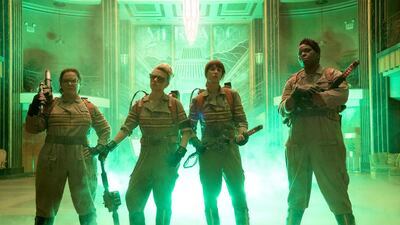As another summer blockbuster season draws to a close, it is fair to say that it has been the strangest for a while.
Last year everything seemed to click for the studios, with big-budget tentpole releases such as Jurassic World, Avengers: Age of Ultron and Minions enjoying critical and box-office success.
This summer, some of the most heavily hyped big releases bombed, low-budget movies soared, critics loathed movies that audiences loved and audiences hated the movies critics adored.
As we look back at the last few months in cinema, is there any way to make sense of it all and explain the turnaround from a year ago?
The big-budget flops
Audiences told the studios in no uncertain terms that huge budgets, big names – on either side of the camera – and extravagant, omnipresent marketing campaigns do not necessarily make a movie a hit.
The producers of Independence Day: Resurgence and Ghostbusters can attest to that. Both movies received lukewarm reviews and audiences voted with their feet. As the dust settles, the best that either of these big-budget bombs can hope for is to break even.
Ghostbusters, in particular, looks likely to lose tens of millions of dollars. Insiders say the movie's break-even point is takings of around US$300million (Dh1.9 billion) – so far it has crawled to just $217m. Don't expect a sequel anytime soon.
This summer also marked a rare failure for the usually untouchable Steven Spielberg. His CGI-heavy family adventure, The BFG, raked in a mere $54.4m in the United States. It also made more than $100m internationally, doing relatively well in the United Kingdom, where the source book’s author, Roald Dahl, is something of a national treasure – but still failed to earn back its budget by the end of its theatrical run.
Fear sells
Traditionally, horror movies do best at the box-office in the winter, particularly around Halloween – for obvious reasons. Some of this summer’s biggest surprise hits, however, were scary movies.
James Wan's The Conjuring 2 was perhaps the least surprising of the big money-spinners, given the success of the first movie (which made $318m from a $20m budget) and the director's rising profile – he was hot off the success of the record-breaking Furious 7, which was partly filmed in Abu Dhabi, and will next direct DC Comics' superhero blockbuster, Aquaman. The horror sequel had double the budget of the original and matched the financial success of the first film, making $320m at the global box office.
Less predictable was the success of Lights Out. The low-budget shocker, which is in UAE cinemas now, has pulled in $126m in ticket sales on a paltry $4.9m budget.
Shark attack horror-thriller The Shallows, starring Blake Lively, was another winner, receiving critical acclaim and box-office success with takings almost six times its relatively modest $17m budget.
Talk of the toon
It was a happy summer, for the most part, for animation studios. Pixar sequel Finding Dory looks likely to easily clear the billion-dollar barrier by the time its overseas run is complete.
The movie had a particularly notable release in the UAE, where it became the first major blockbuster to be given a release during Ramadan, a time when the distributors usually avoid big releases – and it didn't disappoint. With limited competition, the movie easily dominated the box-office charts. More recently, The Secret Life of Pets was another animated-animal international success story, banking more than $700m so far – and it is yet to open in some countries.
The only disappointment was Ice Age: Collision Course. The fifth film in the series didn't quite manage to scrape half of the $817m takings of the previous movie – though given the budget was $105m, it was far from a total disaster.
Superheroes power through
We keep hearing predictions that the superhero bubble is about to burst – but no one seems to have told that to audiences. Captain America: Civil War was the highest-grossing movie of the summer (and the year ao far) with $1.2billion – that's more than a 60 per cent improvement on its predecessor, Captain America: Winter Soldier.
The latest in the X-Men franchise, Apocalypse had a fairly healthy run, with $543m. That was more than $200m down on its predecessor, Days of Future Past, but still a decent return.
And then there is Suicide Squad. Is it a huge success or a dreadful failure? Well, it depends on who you ask. The movie was mauled by the critics (much like its Extended DC Universe predecessor, Batman v Superman: Dawn of Justice), but audiences still turned up in droves to break box-office records on its opening weekend.
Takings did drop off pretty steeply, but the movie has nonetheless pulled in $720m internationally, and is still on general release.
Next to Marvel's all-conquering Captain America: Civil War, the figure might seem a bit disappointing, but to describe a $720m (and counting) movie as a failure is ridiculous.
Surprise, surprise
A couple of movies that few people predicted would be hits stood out this summer. Bad Moms hauled in $126m globally, almost unheard of for an R-rated comedy, while British tear-jerker Me Before You made an impressive $200m despite mixed reviews.
In the UAE, there was surprise success for Mel Gibson's big-screen return in Blood Father. Despite a low-key release, the movie spent two straight weeks atop the UAE box-office this month. It has yet to go on general release in the US – when it is, it will be interesting to see whether it can redeem Gibson and restore his tarnished reputation.

